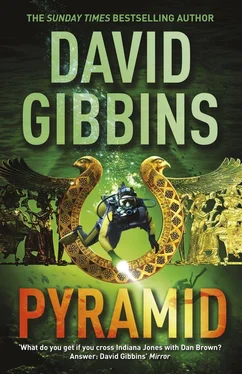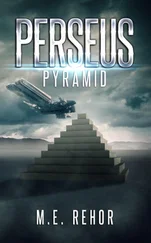“My worst nightmare,” Hiebermeyer murmured. “And he didn’t even have explosives.”
“Any more takers?” Aysha asked.
“Well, there’s Al-Hakim bi-Amr Allah,” Jack said. “The one whom the Druze Christians regard almost as a god. He springs to mind because Rebecca and I talked about how he ordered the destruction of the Holy Sepulchre in Jerusalem in the tenth century.”
“Okay. He’s the one I want. Anything more about him?”
Jack thought for a moment. “Odd behavior. Took to wandering alone at night in the desert, disappearing for days on end. Murdered, I think.”
“And what do you know about the Cairo Geniza?”
Jack stared at her. “Arguably the greatest treasure ever found in Egypt, greater even than Howard Carter’s discovery of Tutankhamun’s tomb.”
Hiebermeyer shot bolt upright. “You’re treading on thin ice there, Jack. Very thin ice.”
Jack grinned at him. “I thought that would get you going. Intellectually , I meant. Tut’s tomb may have contained the greatest physical treasure, but the Geniza has drawn us into the detail of the past like no other archaeological find except perhaps Pompeii and Herculaneum. And studying it hasn’t been just a matter of cataloguing and conservation, but immediately involved some of the greatest scholars of recent times, not just of Jewish religion and literature but also of medieval history and historiography, of the very meaning of history and why we study it.”
Costas peered at Jack. “You’d better fill me in, Jack.”
“Genizot were the storerooms in synagogues where worn-out sacred writings were deposited. In Jewish tradition any sacred or liturgical writing in Hebrew was considered the word of God and therefore couldn’t be thrown away, but the Cairo Geniza was unusual in containing a huge amount of other material related to the medieval Jewish community in Egypt as well. It was found in the Ben Ezra synagogue in Fustat, the Old City of Cairo, the synagogue of the Palestinian Jews. When the Ben Ezra Geniza was opened up in the late nineteenth century, the bulk of it — over two hundred thousand fragments — was shipped to Cambridge under the care of Solomon Schechter, reader in rabbinical studies at the university. I was fortunate to be able to study the archive firsthand when I was researching for my doctorate. I was looking at Jewish involvement in maritime trade in the Indian Ocean.”
Aysha peered at him. “So you’ll know that it also contains a huge amount of incidental detail on early medieval Cairo, and not just on Jewish life.”
“ ‘The unconsidered trifles that make up history,’ as one Geniza scholar put it,” Jack said.
“Including references to the caliphs, and to ancient parts of Cairo that have since been demolished or lie buried beneath the modern city.”
“Where are you heading with this, Aysha? Fustat was the main settlement of Cairo when the Fatimids arrived from Tunisia to take over control of Egypt, and much of the Geniza dates to about the time of Al-Hakim and the two centuries or so that followed. Is that the connection?”
“I don’t want to tell you more now because what we’ve found is being translated as we speak. You need to see it for yourself at the actual place where it was discovered. Today may well be our last chance. Cairo is still open to us, but a midnight curfew has already been imposed, and the city will very likely be a no-go zone within days. I’ve arranged for transport to get us there this evening.”
Jack thought for a moment. “All right. If you think it’ll be a good use of my time here. The clock’s ticking.”
“Believe me, it will.”
Hiebermeyer gestured down the corridor. “Before you go, there’s another friend here who wants to see you. A genius-level physicist with a penchant for computer simulation and Egyptology.”
“Uh-oh,” Costas said, raising his eyes theatrically. “Here we go.”
“What on earth is Lanowski doing here?” Jack asked.
“He flew in from Seaquest late last night. You know that Seaquest is still over the wreck of the Beatrice off Spain? They were making the final preparations for raising the sarcophagus of Menkaure, but there’s been some kind of hitch. He’s come to consult Costas.”
Jack nodded. “I know Captain Macalister’s been trying to get in touch with me. Costas took the call before we came in.”
Costas grinned. “Lanowski comes all the way across the Mediterranean to consult with me? We must really be friends.”
“You and me both,” Hiebermeyer said. “His brain is like an analog of ancient Egypt. Every measurement, angle, and coordinate is in there. I can’t keep up with him.”
Jack pursed his lips. “They weren’t supposed to raise the sarcophagus without me being there. I don’t like being out of the loop.”
Hiebermeyer peered up at him. “Well, Jack, you have been out of the loop. You’ve been incognito in the Gulf of Suez for the last four days, with instructions that nobody from IMU should try to make contact. The board of directors decided to bypass you and authorize the Seaquest team to raise the sarcophagus in your absence. It was a way of deflecting attention from everything that’s going on in Egypt, from the possibility that the antiquities people here might rumble your diving escapade and create a huge stink. Better to get the sarcophagus in the public eye before anything like that happened, and to make a huge splash in the media: Taken from the pyramids at Giza in the 1830s, lost in a shipwreck on the way to the British Museum, recovered by IMU. The board went public about the discovery yesterday, and there are now a dozen reporters and film crews on board waiting for the recovery. The press release has even included your promise that if the protection of the sarcophagus can be guaranteed by the Egyptian authorities and overseen by a UNESCO monitoring team, then it goes back to the pyramid. That’s what we all agreed upon from the get-go.”
Costas snorted. “From the look of what’s going on here, it’s more likely to be hacked to pieces by the extremists.”
“The new antiquities director is aware of that,” Hiebermeyer said. “He may be a political stooge who cares nothing for archaeology for its own sake, but he’s also a pompous egotist who would like nothing better than to be associated with the return of the sarcophagus. He’s been in the job for only six months, but he’s shutting down foreign excavations across Egypt to keep his xenophobic masters in the new regime happy. But at the same time he’s resisting the extremists, who want a repeat of the Taliban nightmare in Afghanistan, the desecration of anything they perceive to be non-Islamic. If the extremists get their way, he knows he’ll be out of a job and just as dispensable as the monuments that are supposedly in his care.”
“It sounds like a losing battle,” Costas said.
Hiebermeyer looked at them grimly. “With the press release the board of directors has been buying us time, dangling a carrot in front of the antiquities director, which results in our own projects in Egypt remaining off the hit list for the time being. We have to pray that the current director remains in power long enough for us to complete our main excavation at the mummy necropolis.”
“And that scenario could crumble to dust at any time,” Costas muttered. “Someone from the extremist faction holds a knife to his throat, or the expected coup takes place and the extremists oust the moderates. Then Egypt winds back to year zero and archaeology goes to hell in a handbasket.”
“I couldn’t have put it better myself,” Hiebermeyer said.
“Were you in on the decision-making about the sarcophagus?” Jack asked him. “Did the board consult you?”
Читать дальше












